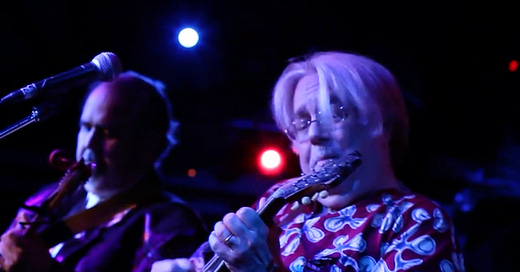When we met at Starbucks, it had been a while since we saw each other. You gave me a hug.. more Bubbe than Bruh. You gushed about your grown kids. You didn’t just kvell at their interests and creative-entrepreneurial exploits (like yours), you marveled in the moment. Telling me as if you were telling it for the first time. Even though I know you told everyone you met… every day about how thrilled you were to catch that show. “Incredible,” you said, eyes wide with wonder.
You said you were sick. I didn’t listen.
Instead, I pitched my idea. You listened. You have always listened. You smiled, leaned in, and said your mantra: “If Dr. Singer is passionate about this, it will be faaabulous; because that’s your thing. You get others to share your passion.”
You gave me advice—unfiltered, plain, and to the point. You instantly understood what I was trying to do and offered visions and ideas I hadn’t considered.
Of course. You spent a lifetime producing Jewish music, educating performers and listeners alike, and channeling musical-passion. But, our conversations were never, “let me tell you what I’ve learned, kid.”
“If you’re trying to reach millennials, you better find millennials to lead it. Sure, every cantor in America will be listening, but no one under 30.” You told me they need to see themselves in it.
“Vulfpek.”
What??
“Amaaazing cats. Lantzmen. You should get them on the show.”
You told me to keep going—“Do the work. Let me know how I can help.”
Sweet. And short.
“Great to see you, bubbe. Give your musical wife a kiss...”
Will do, Stu.
Rebecca and I were traveling when we heard Stuart was gone. Couldn’t believe it. Rachel told me he had been sick for years. I knew, but somehow that wasn’t something Stuart wanted to share with me. Or maybe I wasn’t ready to hear it. Instead, we were always connected through a 30-year friendship grounded in music—making music, recording music, producing music. Each time, we’d share a quick embrace and an update on our kids, who grew up in parallel just half a mile apart. And each time, there was a lesson.
Stuart was an accomplished musician, producer, writer… impressario. He produced Yiddish theater. Traveled the country on a farm tour (of which he mused about often). Helmed The Otters in their Tuesday night residency at Chicago’s Schuba’s.
And—quietly, consistently—he helped countless (mostly) Jewish amateur artists create projects that were anything but amateur in Stuart’s hands and ears. From our first project together in 1995, he railed against that word. “Don’t say that. You’re not an amateur. You’re creating an authentic Jewish experience to share with others.” It sounded hippy-dippy to me then, but he said it for 30 years. He was right, of course.
He was always a rebbe; a teacher. My rebbe. Not always music. Way before the Internet, Stuart was the Internet. I don’t know what he read, but he always had something fascinating to teach me—astrophysics, neuroscience, ornithology, some aspect of the cosmos. All while he adjusted a mic or worked on a mix with me.
In Jewish commentary, there’s this recurring idea that G-d gives prophets an awesome (in the truest sense of the word) vision of their moment in the sweep of Jewish history—from In the Beginning to the proverbial End-of-Days. Avraham, Ya’akov, Moshe, Yehoshua, Yechezkel—they all get this big-picture view that informs their rebuke and leadership. But that clarity comes at a cost: the vision is only recognized for its truest meaning after they’re gone.
It’s a hard lesson—being unable to see what you’ve got when it’s standing in front of you.
I’m sure Stuart would laugh at my clumsy attempt to shoehorn prophecy into a memorial. He loved flirting with apikoros—the Jewish skeptic. Always teaching, always guiding, though I wasn’t always ready to listen.
When we first met, he’d tell me anecdotes about New York jazz musicians backing Mickey Katz in the Catskills or how Klezmer evolved through its collision with other musical traditions. Each story was a gateway to my inherited Jewish musical legacy—a legacy I didn’t yet understand. He’d often speak in shuls about “Machers and Rockers,” weaving Jewish music and history together into something alive and engaging.
Rachel recently gave me a box of his books, music, and LPs she thought I might want. It was uncomfortable, but not because of Stuart’s absence.
I recognized them.
These were the same books and records Stuart had been sharing with me for decades. Never imposing with, “you should get this book,” or, “you really should listen to this.” Always: “I have something interesting for you. It’s here if you want it.”
I think I’m ready now. Took too long, but I’m focused—reading voraciously, listening attentively, asking questions, and sharing what I’ve learned. Finally catching up in my rambling journey toward Jewish literacy.
Thank you, Stuart. Kol hakavod to you for your countless gifts and the ways you transformed others with them. Despite a difficult, too-short life, you live faaaabulously in our hearts and imaginations. Always our musical Rebbe.
Stuart Rosenberg, zichrono livracha, was niftar on May 7, 2024. He lived in Skokie with his wife, Rachel, and their terrific kids, Allegra and Theo. Stuart served as the first board member of the Jewish Song Project. Tzedakah in Stuart’s memory can be given to the Greater Chicago Jewish Festival.





